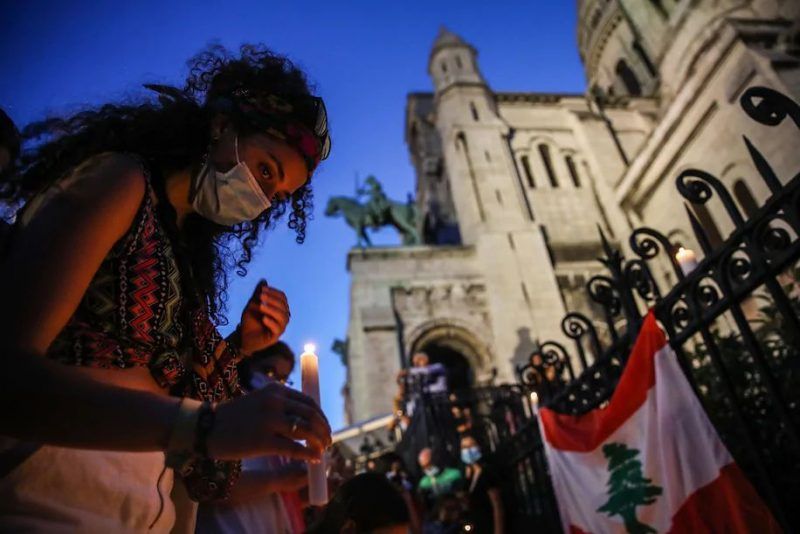
Whenever a disastrous event takes place, such as the explosion in Beirut on Tuesday, communities in the diaspora grapple with the tug and pull of two emotions: feeling helpless and feeling guilty.
As Lebanese living abroad — a group estimated to be nearly three times the size of the national population of 5 million people — many of us have long felt helpless, but perhaps never more so than in 2020. After the revolutionary uprising that began in October brought some hope for change, the covid-19 pandemic brought the world to a grinding halt — and brought Lebanon to the breaking point. Countless headlines of how Lebanon’s currency depreciated into the abyss and how people could not afford food or medicine flooded our social media timelines and television screens.
These headlines may seem like just another day in a Middle Eastern country far away — a problematic way to frame this news and continue perpetuating racist stereotypes. But for us in the diaspora, these were more than news reports. These were our friends, our family members, our loved ones who have seen their life savings dramatically reduced because of hyperinflation or who have lost their livelihoods altogether.
This is all on top of a global pandemic that has strained public and private hospitals and tested the capacity of doctors, nurses and medical practitioners across the country. And on top of power outages that have lasted upward of 10 hours a day.
The fact that 2,750 tons of ammonium nitrate was left unchecked at a warehouse in the port of Beirut since 2014, despite warnings and concerns reportedly brought forth to committees and judges, is the culmination of the government’s corruption. Warlords and politicians — and their families — who have held power basically since the Lebanese Civil War have brought the country to this moment. Their sheer unwillingness to not only take responsibility but also to take action to safeguard its citizens is appalling. Considering the government’s plea to expats to come to Lebanon and invest in Lebanese tourism and businesses, it’s a slap in the face to citizens who are still living in country.
This is where the diaspora’s feelings of guilt come into play.
We are in a place of privilege to have the means and resources to leave Lebanon — whether we left ourselves or it was our parents and grandparents before us. That’s not the case for many people in Lebanon, where the unemployment rate is already about 25 percent and about a third of the country lives in poverty. And that doesn’t even include the millions of Syrian and Palestinian refugees who already face harsh and prejudice policies, or the “kafala” (sponsorship) system that has subjected migrant domestic workers from countries such as Ethiopia into what is essentially a form of modern-day slavery.
I think about that often — about our easy access to food, water and shelter here in the United States. I think about how I am able to process my emotions and grieve far away from the devastation that rocked Beirut. I think about how I must be betraying my friends and family for not being physically next to them.
And lately, I’ve been thinking more about how we as a diaspora helped perpetuate this situation in Lebanon, willingly or not, and how we’ve continued to keep the Lebanese government and politicians afloat. Sometimes, that has taken the form of continuing to support parties and groups that fuel the sectarian divisions that have long plagued Lebanon. Other times, it has been by continuing to pour money and resources into post-war construction projects and financing the country’s deficit.
It feels heavy to think about what we could have done differently and how we can take responsibility for our role. And it is difficult to reconcile those feelings with the feeling of wanting to help, wanting to see Lebanon succeed, wanting to see our friends and families thrive in a financially stable and safe environment.
When the explosion took place, I immediately called my family and friends in Lebanon. I talked to my parents, who have seen corruption in the country take many forms over the course of their lives. They cried; I cried. We all felt paralyzed by what we could do to help immediately.
But I am not in Beirut. I’m in an apartment in Washington, far away from any direct impact. Many of us have called on our respective governments to bypass the Lebanese government and send resources directly to the people. Many others have created crowdfunding websites and aggregated lists of organizations where people can donate. But it’s a painful feeling to be doing this when we are also expected to go on with our daily lives as if things are normal.
I’m not sure if that feeling will ever be reconciled. And of course, it goes without saying the focus cannot solely be on the diaspora. I don’t know how many more times we can expect Lebanese people to rise up, rebuild the country and be “resilient” again. We’ve adapted to survive for so long — and this is where we’ve ended up.
Danny Hajjar is a media relations professional based in D.C.
